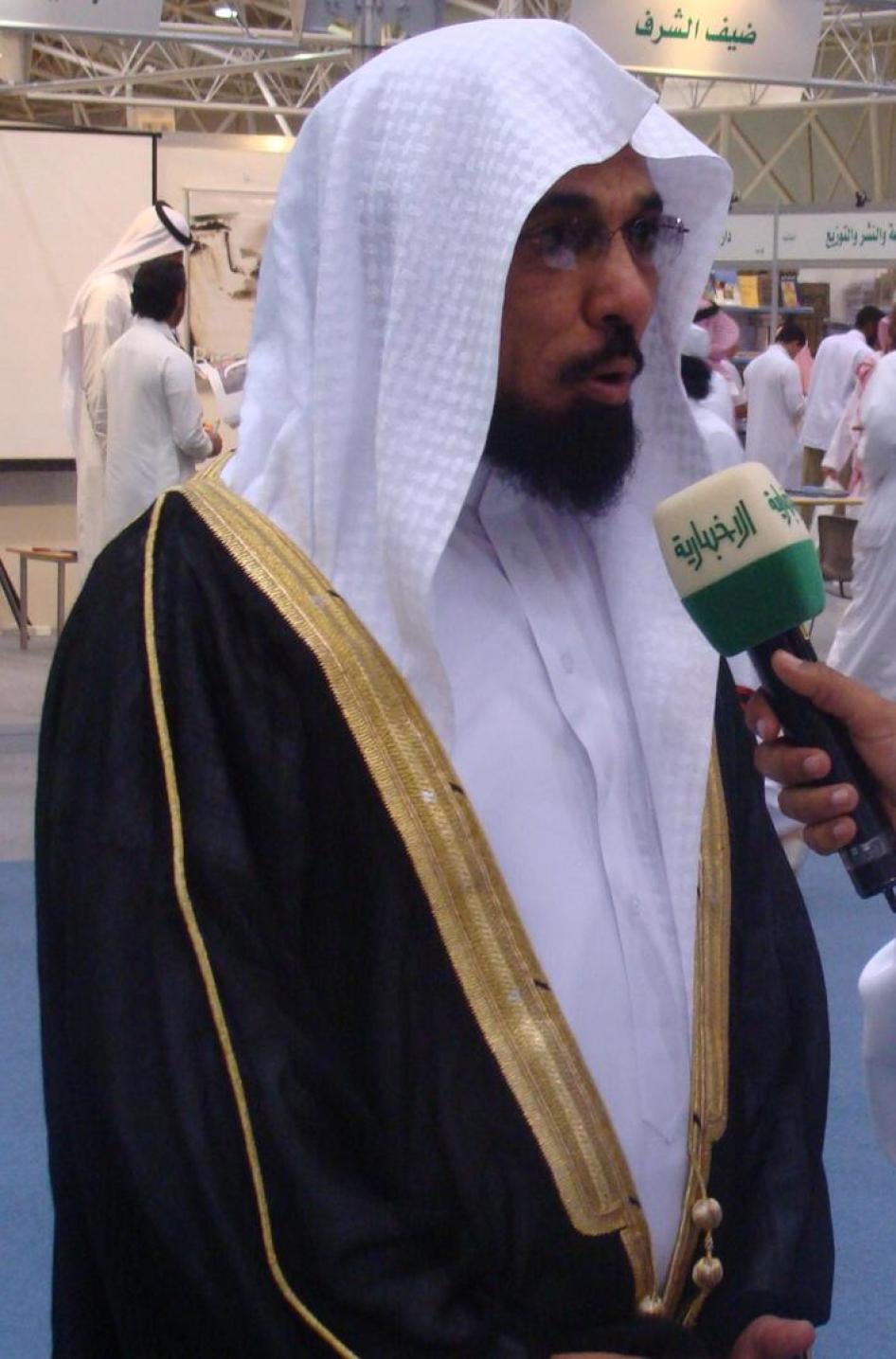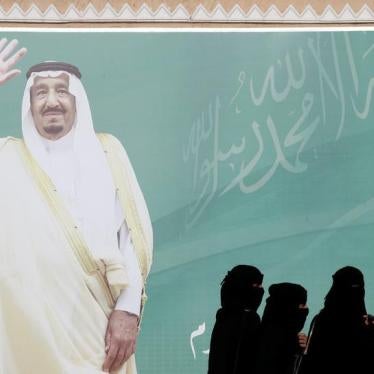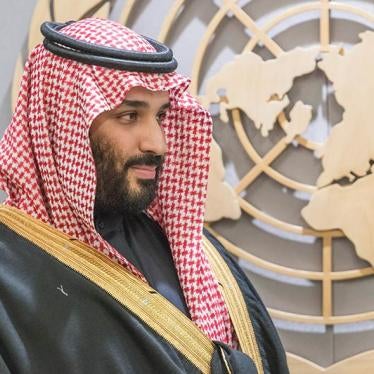(Beirut) – Saudi prosecutors are seeking the death penalty against a prominent cleric on a host of vague charges related to his political statements, associations, and positions, Human Rights Watch said today.
Saudi authorities brought Salman al-Awda, 61, before the Specialized Criminal Court, the country’s terrorism tribunal, on September 3, 2018. A family member told Human Rights Watch that Saudi authorities allowed him contact with a lawyer at the hearing for the first time since his detention a year earlier. At the hearing, prosecutors handed down 37 charges and announced that they would seek the death penalty. The vast majority of the charges are connected to his alleged ties with the Muslim Brotherhood and Qatari government, and his public support for imprisoned dissidents. None refer to specific acts of violence or incitement to acts of violence.
“At a time when Saudi Arabia’s ambitious economic plans such as the Aramco IPO are stalling out, the crown prince’s prosecutors are investing in threatening clerics and women’s rights activists with execution,” said Sarah Leah Whitson, Middle East director at Human Rights Watch. “Unless Saudi Arabia has evidence that al-Awda committed a recognizable crime the authorities should release him immediately.”
Al-Awda was among the first of dozens of people detained in mid-September 2017 by the Presidency of State Security, an agency established only months before, following Mohammad bin Salman’s appointment as crown prince. Al-Awda had remained in detention, partly in solitary confinement, with no lawyer and limited ability to contact family members. Authorities have also detained his brother and banned 17 members of his family from traveling abroad. Al-Awda’s charges coincided with the opening of trials against a number of other people for alleged association with the Muslim Brotherhood.
Al-Awda was a prominent member of the Sahwa Movement in the early 1990s, which criticized Saudi Arabia’s decision to allow the US military into the country to protect it from a potential Iraqi invasion. Since 2011 al-Awda has advocated greater democracy and social tolerance. In January, the office of the UN high commissioner for human rights described al-Awda as “an influential religious figure who has urged greater respect for human rights within Sharia [Islamic Law],” and called for his release.
On September 5, local Saudi media outlets printed the first five of the charges, and Human Rights Watch reviewed the others from a copy of the court’s charge sheet it obtained. The initial charges are mostly related to his alleged ties to the Muslim Brotherhood and other organizations supposedly connected to it. Saudi Arabia declared the Muslim Brotherhood a terrorist organization in March 2014. One such organization listed in the charge sheet, the International Union of Muslim Scholars, was not named as a terrorist organization by Saudi authorities until November 20, 2018, over two months after al-Awda’s arrest.
The first charge reads: “Corrupting the land by repeatedly endeavoring to shake the structure of the nation and bring about civil strife; inflaming society against the rulers and stirring up unrest; and connection to characters and organizations and holding meetings and conferences inside and outside the kingdom to enact the agenda of a terrorist organization against the nation and its rulers.”
Multiple charges relate to his public solidarity with imprisoned dissidents, opposing the Saudi-led isolation of Qatar in mid-2017, and alleged ties to the Qatari government. Other charges include having “a suspicious relationship” with the former Gaddafi government in Libya, publicly opposing Saudi Arabia’s hosting of former Tunisian president Zine El Abidine Ben Ali, “mocking governmental achievements,” and “offending patriotism and loyalty to the government and the country…”
Another group of charges alleges that al-Awda violated terrorism financing regulations by calling for donations for “the Syrian Revolution” and rebel groups “outside the jurisdiction of official agencies,” without citing specific incidents or groups. Al-Awda, merely called for people to donate to charity organizations operating in Syria, the family member said.
Saudi authorities detained al-Awda on September 7, 2017. On September 12, 2017, the Presidency of State Security announced that it was taking action against those acting “for the benefit of foreign parties against the security of the kingdom and its interests.” Authorities detained al-Awda’s brother Khaled later that month after he tweeted about his brother’s detention, media reported. He remains in detention.
A family member told Human Rights Watch at the time of al-Awda’s arrest that he believed it was related to al-Awda’s failure comply with an order from Saudi authorities to tweet a specific text to support the Saudi-led isolation of Qatar. Instead, he posted a tweet on September 9, just before his arrest, which stated in part, “May God harmonize between their hearts for the good of their people,” an apparent call for reconciliation between the Gulf countries.
Al-Awda was among dozens of dissidents, writers, and clerics detained in September 2017. Activists have circulated lists of more than 60 people being held, though Saudi authorities have not released information about their cases.
Other prominent detainees in the group include Essam al-Zamil, an economist; Mustafa al-Hasan, an academic; Abdullah Al-Malki, a writer; and dozens of other clerics including Awad al-Qarni, Ibrahim al-Nasser, and Ibrahim al-Fares. Authorities imprisoned Abdulaziz al-Shubaily and Issa al-Hamid, human rights activists, around the same time. Both had lost appeals of convictions for their human rights work following unfair trials.
Al-Awda’s trial follows a recent crackdown on women’s rights activists in Saudi Arabia that has led to the arrest of at least 13 women under the pretext of maintaining national security.
The charges against al-Awda do not cross the threshold of crimes for which capital punishment can be justified under international human rights law even in countries that still have the death penalty. International standards, including the Arab Charter on Human Rights, ratified by Saudi Arabia, require countries that retain the death penalty to use it only for the “most serious crimes,” and in exceptional circumstances. In 2012, the United Nations special rapporteur on extrajudicial, summary, or arbitrary executions stated that where used, the death penalty should be limited to cases in which a person is intentionally killed.
Human Rights Watch opposes capital punishment in all countries and under all circumstances. Capital punishment is unique in its cruelty and finality, and it is inevitably and universally plagued with arbitrariness, prejudice, and error.
“Saudi Arabia’s Western allies should stop pretending that the country has a reform agenda when at the same time the Saudi justice system is threatening to kill peaceful government critics,” Whitson said.









